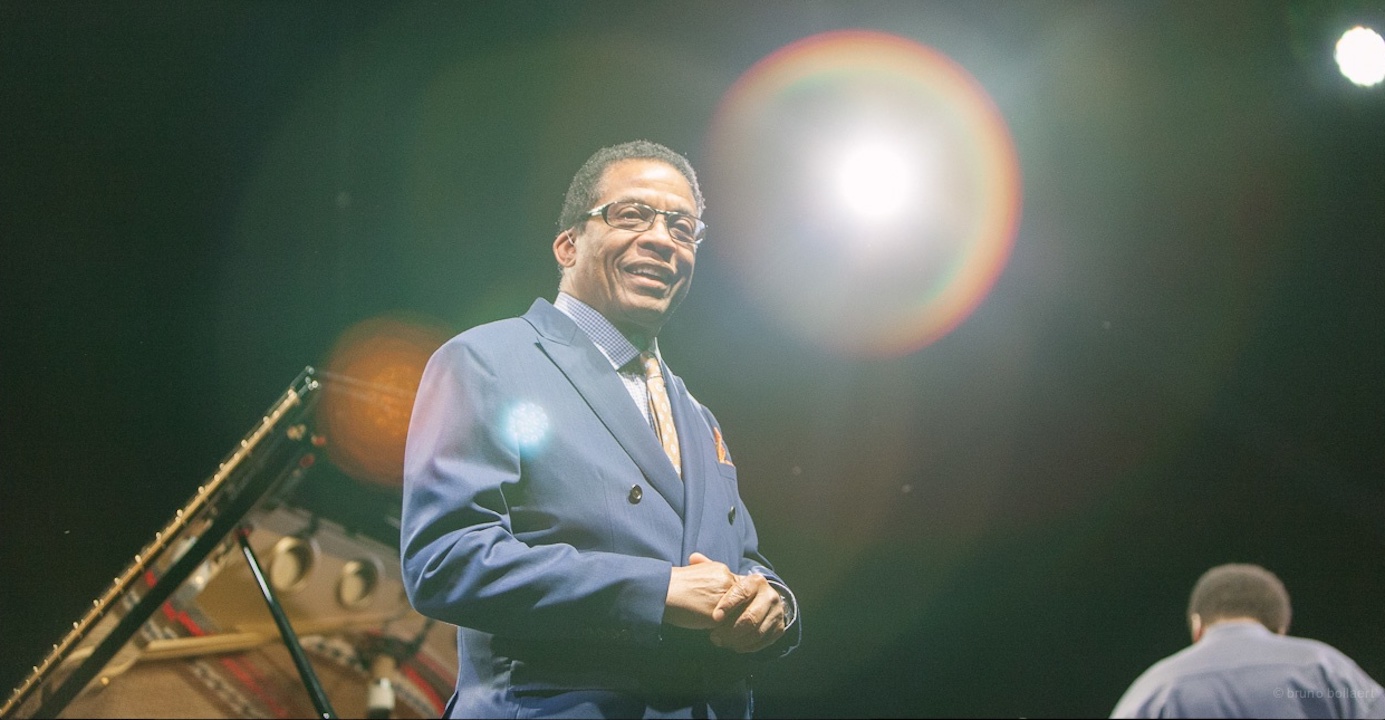Herbie Hancock: A Primer for the Jazz Fusionist, Miles Davis Collaborator
Jazz legend Herbie Hancock has crafted a diverse career and provided a foundation for artists of many genres. Ann Delisi, host of Essential Music, looks at his legacy and accomplishments.

Jazz icon Herbie Hancock began his extraordinary journey on April 12, 1940, in Chicago, Ill.
“First of all, I define myself as being a human being, first. But there are other aspects. I say I’m a jazz musician, it’s easier to just say that. Basically that’s where I’m coming from, no matter which genre I may be expressing myself in.” — Herbie Hancock, musician
He was born in Chicago and took an interest in piano when he was a kid. He started as a classical musician before his interest shifted to jazz. He is known as one of the world’s most accomplished and adventurous jazz artists.
Ann Delisi, host of Essential Music, broadcast a special tribute to Hancock, his vast musical history, immense talent and sense of adventure that has left an indelible mark on music.
Listen: Ann Delisi’s tribute to Herbie Hancock, and see a musical primer for Hancock below.
In this tribute:
-
His early musical influences, how he discovered jazz and embraced Buddhist philosophy in 1972.
-
His first meeting with Miles Davis and playing in Davis’ second great quintet.
-
He discusses transforming his music with the times, referencing his “Head Hunters” albums and fusing jazz with hip hop.
-
His favorite song, written for a commercial for Yardley’s Men’s Cologne, one of his many corporate clients that included Pillsbury, Standard Oil, Tab Diet Cola and Virginia Slims.
Trusted, accurate, up-to-date
WDET is here to keep you informed on essential information, news and resources related to COVID-19.
This is a stressful, insecure time for many. So it’s more important than ever for you, our listeners and readers, who are able to donate to keep supporting WDET’s mission. Please make a gift today.
The Herbie Hancock Primer
“Watermelon Man” (1962)
In 1962, Hancock recorded his debut album for Blue Note Records titled “Takin’ Off,” that included the song “Water Melon.”
The song featured Dexter Gordan and Freddie Hubbard. It was an unlikely hit for this young artist that was later inducted into the Grammy Hall of Fame in 1998.
“I started thinking about, what can I write honestly about the Black experience? My own personal Black experience. I couldn’t write about chain gangs, I couldn’t write about work songs, cause I hadn’t worked in the cotton fields,” Hancock said. “I was born in Chicago. The water melon man, going through the alleys of Chicago, horse-drawn wagon and the cart going over the cobblestones. Maybe I can capture something that has a rhythm-inspired by that.”
“Maiden Voyage” (1965)
“Maiden Voyage” was the title track from Hancock’s 1965 solo album on Blue Note which received the Grammy Hall of Fame award in 1998.
“Rockit” (1983)
Ten years after his genre-bending “Head Hunters” album, Hancock released “Future Shock” in 1983 that included the song “Rockit.” It fused Jazz and hiphop with an innovative video that was a hit on MTV, grabbing five MTC Video awards and the Grammy award for Best R&B Instrumental Performance.
“Cantaloupe Island” (1964), remixed into “Cantaloop” by US3 (1993)
Hancock’s music found its way into the world of sampling and one of his most recognizable pieces is “Cantaloupe Island” released in 1964.
Years later, in 1993, US3 samples that Hancock standard in “Cantaloop.”
In US3’s version, the words “How about a big hand” was the voice of emcee Pee Wee Marquette from the Birdland Jazz Club in New York when Art Blakey was recording an album. Also sampled was the intro to Jazz saxophonist Lou Donaldson’s performance of “Everything I Do Gonna Be Funky.”
“Bring Down the Birds” (1966) and Deee-Lite’s “Groove Is In the Heart” (1990) feat. Bootsy Colling and Q-Tip from A Tribe Called Quest
Another Hancock piece titled “Bring Down the Birds” from the blowup soundtrack, provided the foundation for Deee-Lite’s dance hit “Groove is in the Heart.”
Corinne Bailey Rae’s “River” (2008)
In 2007, Hancock produced a tribute album to honor his friend Joni Mitchell, titled “River: The Joni Letters,” in which artists such as Tina Turner, Norah Jones, Leonard Cohen, Wayne Shorter and Corinne Bailey Rae performed Mitchell’s songs.
It was only the second Jazz album to win the Grammy award for Album of the Year, which he won in 2008 up against Kanye West, Foo Fighters, Amy Winehouse and Vince Gill.

